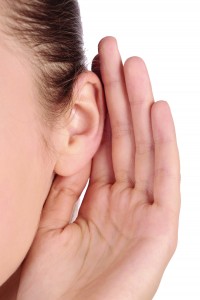From a young age, many of us are taught how to clean our ears in the comfort of our homes. Earwax, or cerumen, is commonly considered something dirty that must be cleaned on a regular basis to maintain personal hygiene. However, earwax is present for a reason: to protect the ear drum from foreign objects and push dead skin cells out of the canal. Home remedies interrupt this important self-cleaning system and aren’t recommended for proper earwax care.
What Is the Best Earwax Cleaning Remedy?
At-home wax removal by Q-Tips, ear candles, or water syringes can cause preventable harm to the ear. Q-Tips are foreign objects that push a majority of wax back into the canal and what they remove is vital for hearing health. The moisture introduced by water flushing methods can cause infection in the ear canal. Ear candling has been proven ineffective for removing wax and introduces the danger of embers or hot wax from the candle entering the ear.
Dr. Jessica Woods, AuD, CCC-A instructs patients that the best cleaning method is to wipe excess wax that escapes the canal with a damp cloth as needed. If a wax blockage causes concern or diminishes the ability to hear, mineral oil can be used to soften the wax so the skin can push it out of the canal. We also perform professional wax removals in the office, as long as a patient isn’t on blood thinners.
 Wax Issues for Hearing Aid Users
Wax Issues for Hearing Aid Users
Wax interferes with the functionality of hearing aids as well. Those who wear hearing aids can find that the normal process of wax moving outward through the canal is disrupted because the device is in the way. As a result audiologists, like Dr. Woods, check for wax blockages in the ear and for buildup inside the hearing aids, especially when troubleshooting possible causes for an issue with the devices.
In an effort to prevent problems, most hearing instruments include wax guards. These small plastic filters protect a device and should be changed once a month, unless an individual naturally produces less wax. Hearing aid users can switch out the wax guards themselves, if they have the necessary dexterity, but a caregiver or an audiologist can easily perform this task as well.
If you consistently battle earwax or struggle with hearing aids that don’t work properly, now is the time to care for your ears. Please contact us for a personal assessment, wax removal, and other tips.
